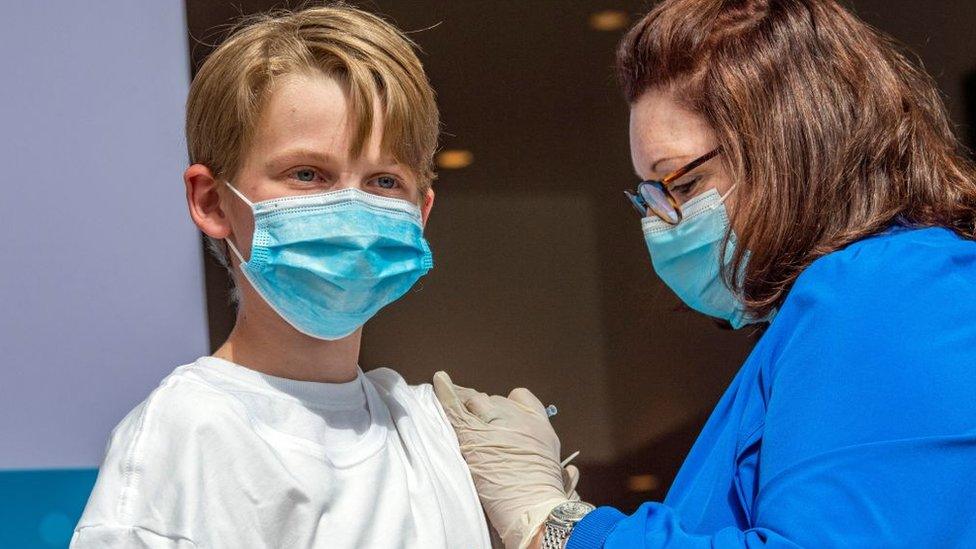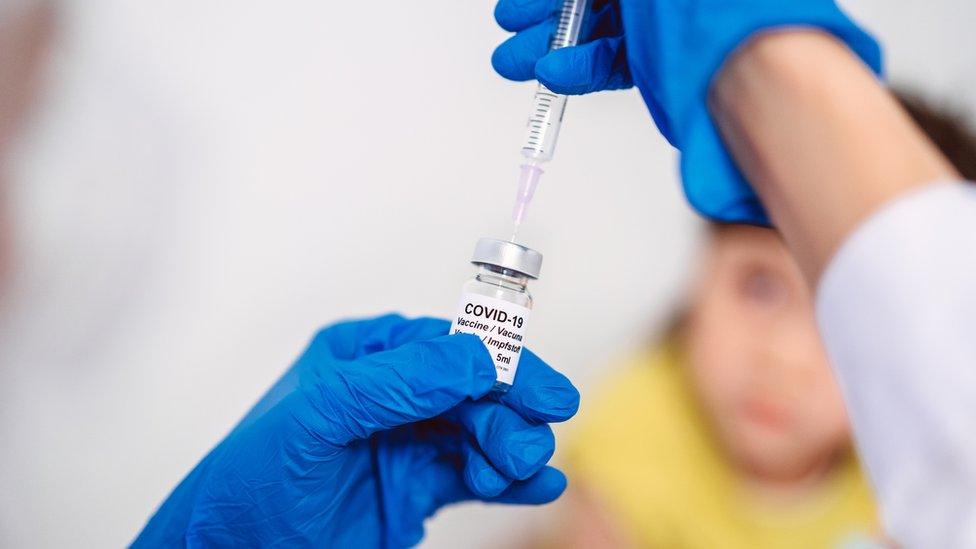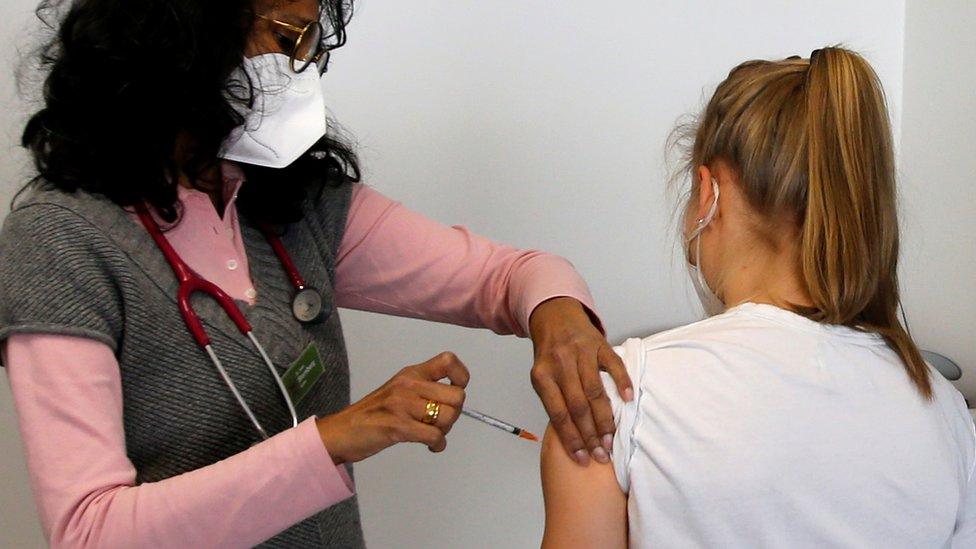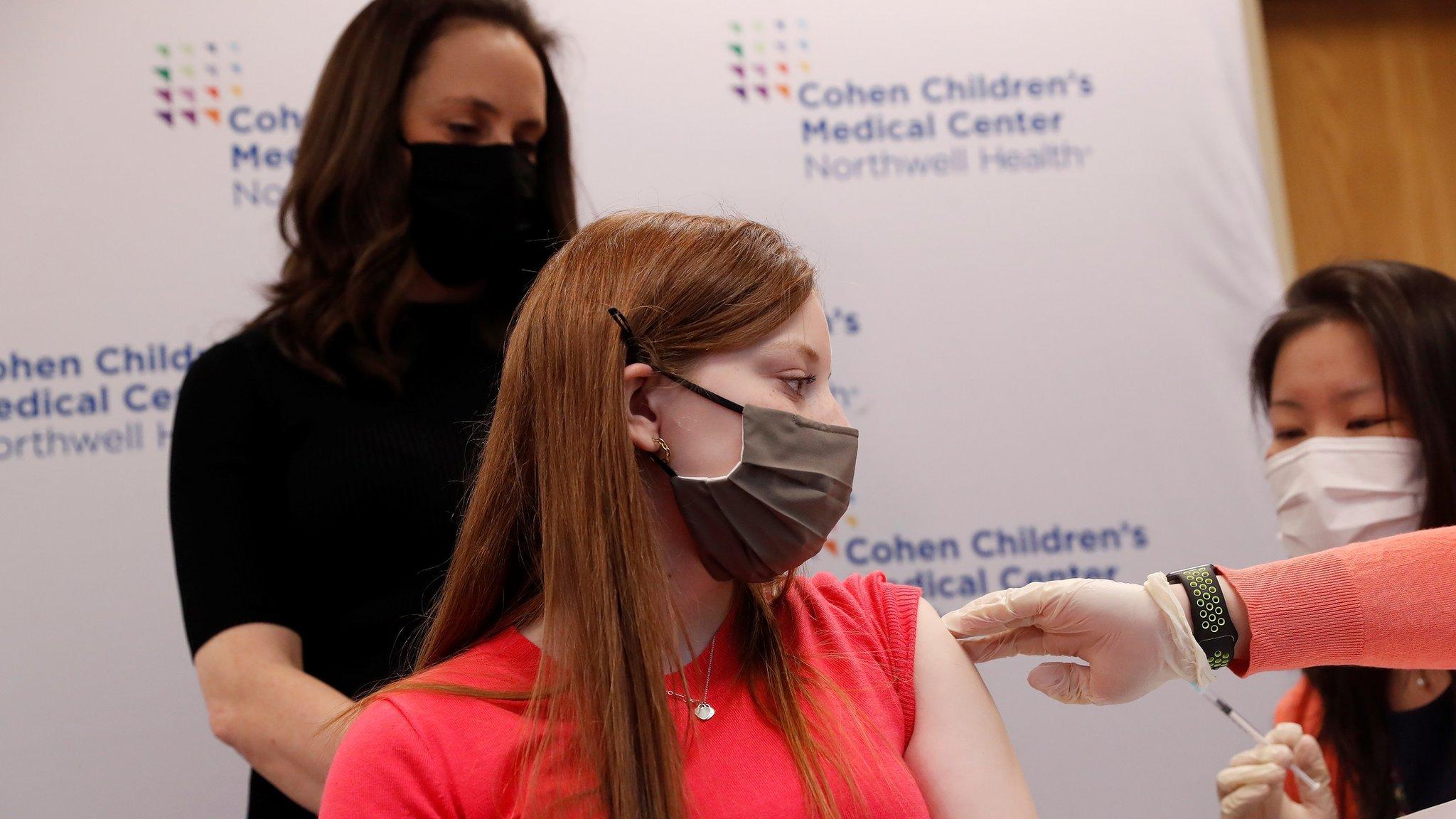UK approves Pfizer jab for 12 to 15-year-olds
- Published
- comments

In the US, a 13-year-old boy is vaccinated with the Pfizer-BioNTech vaccine in May
The UK regulator has approved the use of the Pfizer-BioNTech vaccine in children aged 12-15, saying it is safe and effective in this age group and the benefits outweigh any risks.
The MHRA said it had carried out a "rigorous review" of the vaccine in adolescents.
The UK's vaccines committee will now decide whether children should get the jab.
The Pfizer vaccine is already approved for use in people aged 16 and over.
Dr June Raine, chief executive of the Medicines and Healthcare products Regulatory Agency (MHRA) said the safety of the vaccine in 12 to 15-year-olds would be carefully monitored.
"No extension to an authorisation would be approved unless the expected standards of safety, quality and effectiveness have been met," she said.
The Joint Committee on Vaccination and Immunisation (JCVI) must now advise government on whether this age group should be vaccinated as part of the UK rollout.
A spokesperson for the Department of Health and Social Care said it would be "guided by the expert advisers and will update in due course".
The Health Secretary Matt Hancock said any decision would be "clinically based". He confirmed that the UK had enough supplies to vaccinate children if recommended to by the JCVI.
Covid vaccine safety: How does a vaccine get approved?
At present, there is no routine vaccination of under 18s against Covid in the UK.
However, current advice is that 16 to 18-years-old who are in a priority group or who live in the same house as someone who is extremely vulnerable, should be offered a Covid vaccine.
Complex issue on children
In general, children's risk of becoming ill with Covid-19 is extremely low and they very rarely need hospital treatment, which is why the focus has been on vaccinating adults, who are more at risk. But the question of whether to protect children is now gathering pace.
The EU recently approved the Pfizer-BioNTech vaccine for 12 to 15-year-olds, and the US and Canada started vaccinating children in this age group earlier this month.
Germany has indicated it will start vaccinating children over 12 from 7 June.
Prof Adam Finn, a member of the JCVI, said there were lots of complex issues to consider in the UK, including the potential disruption to children's education if cases continued to rise in unvaccinated schoolchildren.
But he said the immediate question was "what to do with the vaccines we have got - if we give them to 12 to 15-year-olds, then we are not giving to other adults who may be more at risk", he told BBC Radio 4's World At One programme.
Prof Finn said Israel had managed to keep cases low by vaccinating their entire adult population, meaning they did not need to vaccinate children.
But the director of public health in Blackburn with Darwen has called for 12 to 18-year-olds to be vaccinated as quickly as possible to help shut down the transmission of the variant first identified in India, known as the Delta variant.
The health secretary says there is enough supply to vaccinate children if a roll-out is given the go ahead
Prof Russell Viner, professor of adolescent health at University College London, said decisions about vaccinating all teenagers should also take potential side effects into account.
"The early reports about myocarditis [inflammation of the heart muscle] in young men need to be properly investigated and may not be related to the Pfizer vaccine, however they provide a warning that we should not rush into these decisions."
Safety and ethics
Alongside the regulator, a UK independent advisory group also analysed data on the quality, effectiveness and safety of the vaccine in adolescents against any potential risk of side effects.
The Commission on Human Medicines concluded that "its benefits outweigh any risk".
The data is based on more than 2,000 children aged 12 to 15-years-old who took part in US trials of the Pfizer vaccine. There were no cases of Covid from a week after the second dose - compared to 16 cases in the placebo group, and the vaccine appeared to work as well in adolescents as in young adults aged 16-25.
The vaccine's side effects were usually mild or moderate, including tiredness, headaches, muscle and joint pain, and improved within a few days.
Additional safety data from 600,000 adolescents in the US who have had the vaccine will be available soon.
But some argue there are ethical issues over vaccinating children that have to be considered too.
"We urgently need to increase the supply of the vaccine to vulnerable people at high risk in countries with the greatest need," said Prof Dominic Wilkinson, consultant paediatrician and professor of medical ethics at the University of Oxford.
"It is unethical to give vaccines to people at very low risk in our own country when there are others overseas at much higher risk who are dying."
Half of the UK adult population has now been fully vaccinated, a quarter has had one dose and the other quarter - around 13 million people - is yet to be vaccinated.
Related topics
- Published31 March 2021

- Published28 May 2021

- Published11 May 2021
